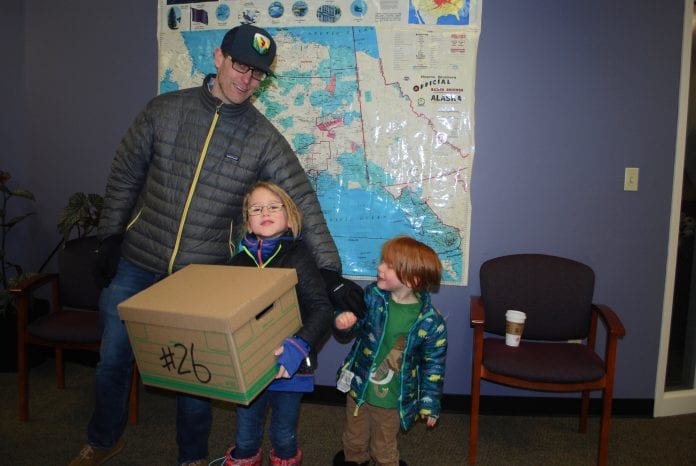
Backers of an initiative to update a 60-year-old law guiding development of projects in salmon habitat have gathered over 49,500 signatures in support of putting the measure before voters during an election in 2018.
Volunteers for Yes for Salmon delivered boxes of petitions signed by residents from all 40 House districts on Jan. 17 to Alaska Division of Election headquarters in Anchorage.
State workers now have 60 days to verify that a minimum of 32,147 of those signers are registered to vote in Alaska.
Petitioners for initiatives are required to gather signatures to cover at last 32 of the 40 House districts, “but we got all 40,” said Sam Snyder, Anchorage director of engagement for Trout Unlimited, who got help from his youngsters, Finn, 6, and Deacon, 4, carrying in the boxes.
Under current law, the Alaska Department of Fish and Game assesses development projects in areas of salmon habitat based on what the law calls “the proper protection of fish and game,” but without clear guidelines on the meaning of “proper protection,” the standards for permitting are vague, the petitioners contend.
Yes for Salmon is a diverse group of individuals, businesses and organizations concerned about protection of salmon habitat, which is critical to commercial, sport and subsistence fish harvesters, as well as abundant wildlife in Alaska.
“Good-intentioned, yet irresponsible, development in the Lower 48 wiped out wild salmon populations,” said Gayla Hoseth, an initiative sponsor and Second Chief of the Curyung Tribal Council in Dillingham. “This is our chance to make sure Alaska does not repeat that history.
“This is a promising moment for all Alaskans,” said Stephanie Quinn-Davidson another ballot sponsor and director of the Yukon River Inter-Tribal Fish Commission. Petition signers from Nome to Ketchikan are saying they want the opportunity to update the laws to reflect a true balance between responsible development and protection of salmon, she said.
A third ballot sponsor, Mike Wood of the Susitna River Coalition, also helped carry in the boxes of petitions as soon as the agency opened for the day. Wood said he’s driven in from north of Talkeetna a day earlier to be on hand for the event.
Opponents of the initiative, whose numbers include the Alaska Chamber of Commerce, Alaska Miners Association, Alaska Oil and Gas Association, Cruise Lines International Association Alaska and all 12 regional Alaska Native corporations, say it is a threat to the state’s economy.
That group, organized as Stand for Alaska, released a statement shortly after the petitions were stacked high on the Division of Elections counter, saying that existing resource development like oil and mineral production, timber harvests and tourism could be negatively impacted and even brought to a halt by the initiative.
“Projects like building a road or a water treatment plant in rural Alaska will be nearly impossible if this measure becomes law,” said Aaron Schutt, Stand for Alaska co-chair and president and chief executive officer of Doyon Limited, a regional Alaska Native corporation based in Fairbanks. “Our communities cannot grow and thrive under policies like this,” he said.
The initiative is too broad and vague and “is based on the mistaken belief that current regulations are inadequate to protect salmon habitat” said Marieanna Hall, executive director of the Resource Development Council for Alaska.
“The last thing we need is more expensive, time consuming and unnecessary policies that cost Alaskans their livelihoods,” said Joey Merrick, business manager and secretary-treasurer of Laborers’ Local 341.














